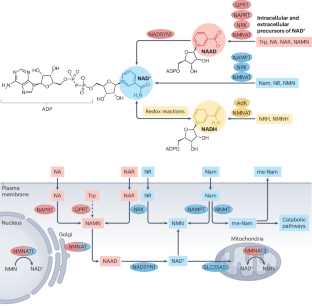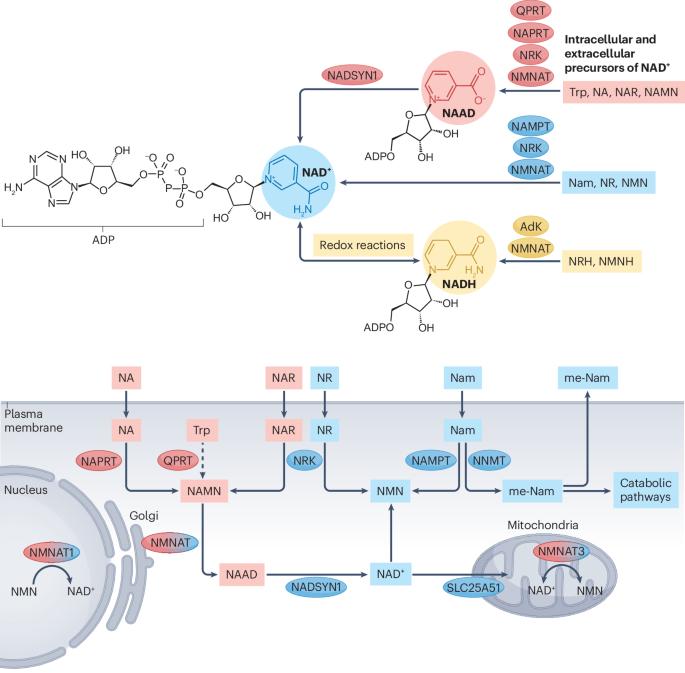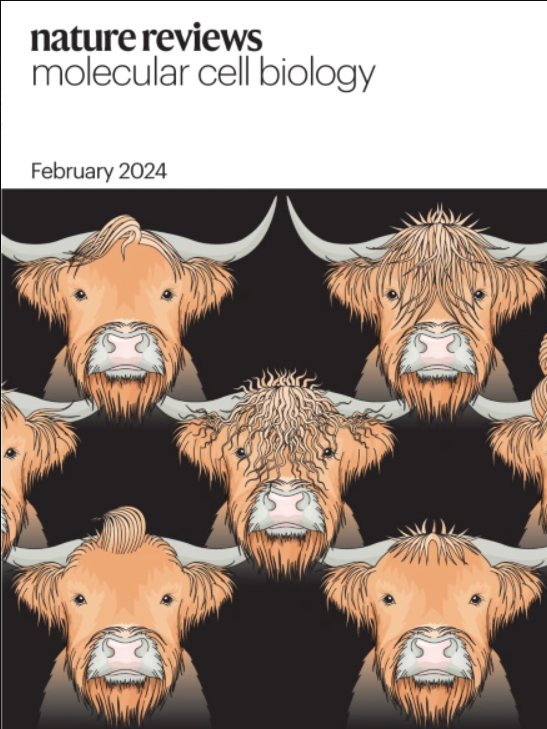Regulation of and challenges in targeting NAD+ metabolism
IF 81.3
1区 生物学
Q1 CELL BIOLOGY
引用次数: 0
Abstract
Nicotinamide adenine dinucleotide, in its oxidized (NAD+) and reduced (NADH) forms, is a reduction–oxidation (redox) co-factor and substrate for signalling enzymes that have essential roles in metabolism. The recognition that NAD+ levels fall in response to stress and can be readily replenished through supplementation has fostered great interest in the potential benefits of increasing or restoring NAD+ levels in humans to prevent or delay diseases and degenerative processes. However, much about the biology of NAD+ and related molecules remains poorly understood. In this Review, we discuss the current knowledge of NAD+ metabolism, including limitations of, assumptions about and unappreciated factors that might influence the success or contribute to risks of NAD+ supplementation. We highlight several ongoing controversies in the field, and discuss the role of the microbiome in modulating the availability of NAD+ precursors such as nicotinamide riboside (NR) and nicotinamide mononucleotide (NMN), the presence of multiple cellular compartments that have distinct pools of NAD+ and NADH, and non-canonical NAD+ and NADH degradation pathways. We conclude that a substantial investment in understanding the fundamental biology of NAD+, its detection and its metabolites in specific cells and cellular compartments is needed to support current translational efforts to safely boost NAD+ levels in humans. Nicotinamide adenine dinucleotide (NAD+) has essential roles in metabolism and can be readily supplemented, potentially to benefit human health. This Review discusses recent insights into the roles of the microbiome and cellular compartments in regulating NAD+ metabolism, and the promise and pitfalls of NAD+ supplementation.


针对 NAD+ 代谢的调节和挑战。
氧化型(NAD+)和还原型(NADH)烟酰胺腺嘌呤二核苷酸是一种还原氧化(氧化还原)辅助因子,也是在新陈代谢中发挥重要作用的信号酶的底物。人们认识到,NAD+ 的水平会随着压力而下降,但可以通过补充剂随时得到补充,因此,人们对提高或恢复人体 NAD+ 水平以预防或延缓疾病和退化过程的潜在益处产生了极大的兴趣。然而,人们对 NAD+ 及相关分子的生物学特性仍然知之甚少。在本综述中,我们将讨论目前有关 NAD+ 代谢的知识,包括可能影响 NAD+ 补充成功与否或导致风险的限制因素、假设因素和未被重视的因素。我们强调了该领域目前存在的一些争议,并讨论了微生物组在调节烟酰胺核糖核苷(NR)和烟酰胺单核苷酸(NMN)等 NAD+ 前体的可用性方面所起的作用、多个细胞区存在不同的 NAD+ 和 NADH 池以及非经典的 NAD+ 和 NADH 降解途径。我们的结论是,需要投入大量资金来了解 NAD+ 的基本生物学特性、其检测方法以及其在特定细胞和细胞区室中的代谢物,以支持目前为安全提高人体 NAD+ 水平所做的转化工作。
本文章由计算机程序翻译,如有差异,请以英文原文为准。
求助全文
约1分钟内获得全文
求助全文
来源期刊
CiteScore
173.60
自引率
0.50%
发文量
118
审稿时长
6-12 weeks
期刊介绍:
Nature Reviews Molecular Cell Biology is a prestigious journal that aims to be the primary source of reviews and commentaries for the scientific communities it serves. The journal strives to publish articles that are authoritative, accessible, and enriched with easily understandable figures, tables, and other display items. The goal is to provide an unparalleled service to authors, referees, and readers, and the journal works diligently to maximize the usefulness and impact of each article. Nature Reviews Molecular Cell Biology publishes a variety of article types, including Reviews, Perspectives, Comments, and Research Highlights, all of which are relevant to molecular and cell biologists. The journal's broad scope ensures that the articles it publishes reach the widest possible audience.

 求助内容:
求助内容: 应助结果提醒方式:
应助结果提醒方式:


